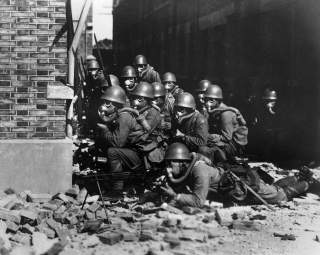China is Right to Backdate Its War With Japan to 1931 (But for the Wrong Reasons)
The government is making a bold play to stoke nationalism and burnish the credentials of the Communist Party.
The history books tell us that the Second Sino-Japanese War began in 1937, ended with Japan's defeat by the Allies in 1945, and cost the lives of perhaps 20 million Chinese soldiers and civilians.
China now says the history books are wrong. The Second Sino-Japanese War began in 1931, according to the Chinese government.
China is right. Unfortunately, it is right for the wrong reasons.
Until now, the accepted version of history has been that the Second Sino-Japanese War began in July 7, 1937, with the Marco Polo Bridge Incident. During training exercises by the Japanese army, which was already occupying Manchuria and parts of northern China, a Japanese soldier went missing near the Marco Polo Bridge southwest of Beijing. The soldier later turned up unharmed, but the incident became a pretext for Japan to launch a full-scale war to conquer all of China.
However, China now dates the war back to 1931, with Japan's invasion of Manchuria. The Manchurian Incident began on September 18, 1931, with Japanese soldiers who had allowed by treaty to guard Manchurian rail lines -- even though this was Chinese territory -- that were servicing Japanese economic interests in the region. Fearing rising Chinese nationalism and eager to expand Japan's empire, these soldiers defied orders from their own civilian government, and staged a fake sabotage attempt on the Japanese-owned South Manchurian Railway. This gave Japanese militarists an excuse to seize all of Manchuria and establish the puppet state of Manchukuo.
Just to keep the math consistent, China has also changed the official name of the conflict in school textbooks from the “Eight-Year War of Resistance Against Japanese Aggression” to the “14-Year War of Resistance Against Japanese Aggression.”
“The Chinese Ministry of Education said the decision to add six years to the war sought to promote patriotic education and to highlight the Communist Party’s 'core role' in resisting Japanese fascism in the prelude to World War II,” the New York Times wrote. “It also seemed intended to rally support for the party among young people as Mr. Xi [Chinese President Xi Jinping] vigorously promotes Communist history and thought in schools.”
Japan, which has been accused of rewriting its own textbooks to minimize the record of Japanese aggression and atrocities, denounced the move. A Japanese government spokesman said “that it was not up to the Chinese government to decide the length of the war,” according to the New York Times.
“It is important that Japan and China should demonstrate they do not focus excessively on the unfortunate past,” the spokesman said.
Unfortunately, that “unfortunate past” will not die. While the Japanese still consider themselves victims because of the atomic bombs, Chinese still remember massive atrocities such as the Rape of Nanking, or Koreans the “comfort women” sex slaves they were forced to provide to Japanese soldiers.
There are two ways of looking at raw, sensitive history like this: as pure history (what happened) and applied history (what does it mean today). As pure history, China's revision is justified. By any reasonable standard, Japan's seizure of Manchuria -- a 360,000-square-mile region bigger than Texas -- was an act of war.
“It does make a lot of sense to set 1931 rather than 1937 as the first year of the Second Sino-Japanese War,” Peter Harmsen, author of a book on Japan's 1937 assault on Nanking, told me. “The 1931 Manchurian 'Incident', as it has been euphemistically called, was in reality a full-scale Japanese invasion of territory that had been part of China for centuries. Indeed, to get an idea of the scale of what was going on, the area occupied by the Japanese Army in 1931 was more than five times larger than the western half of Poland occupied by Nazi Germany eight years later.”
As Harmsen points, dates can often be arbitrary. "What right do we have in the West to claim that World War II broke out in 1939?" he asks. In September 1939, World War II was essentially a local conflict between European powers. Did it only become a "world war" once the United States and Japan engaged in hostilities in 1941?
As the aggressor, Japan has little right to complain about how China remembers a war that killed so many of its people. Nonetheless, what's troubling is that the Chinese government isn't backdating the Second Sino-Japanese War out of fidelity to the dead or compassion for the living. The government is doing it to stoke nationalism and burnish the credentials of the Communist Party.
The irony, of course, is that the bulk of the fighting and dying in China's war with Japan was done by the Chinese Nationalists, or Kuomintang. Corrupt and inept as the Nationalists were, they tied down much of the Japanese army and thus facilitated the U.S. defeat of Japan. But they lost the subsequent civil war to the Communists. And they will lose in the latest rewrite of history.
Michael Peck is a contributing writer for the National Interest. He can be found on Twitter and Facebook.
Image: Japanese Special Naval Landing Forces in the Battle of Shanghai, 1937. Wikimedia Commons/Public domain

